Evaluating Social Media's Impact on Candidate Screening Process
VerifiedAdded on 2022/07/22
|12
|3489
|381
Essay
AI Summary
This essay examines the use of social media in the candidate screening process, focusing on its advantages and disadvantages. It begins by introducing the topic and outlining the essay's structure. The body of the essay delves into the disadvantages, including concerns about invasion of privacy and the unreliability of information found on social media. It then explores the advantages, such as eliminating discrepancies in candidate information and reducing costs and time in the recruitment process. The essay also considers alternative methods for employers to screen job candidates. The conclusion summarizes the arguments presented, weighing the benefits and drawbacks of using social media in hiring decisions. The essay emphasizes the ongoing debate surrounding the ethical implications of social media screening and its impact on candidate evaluation.
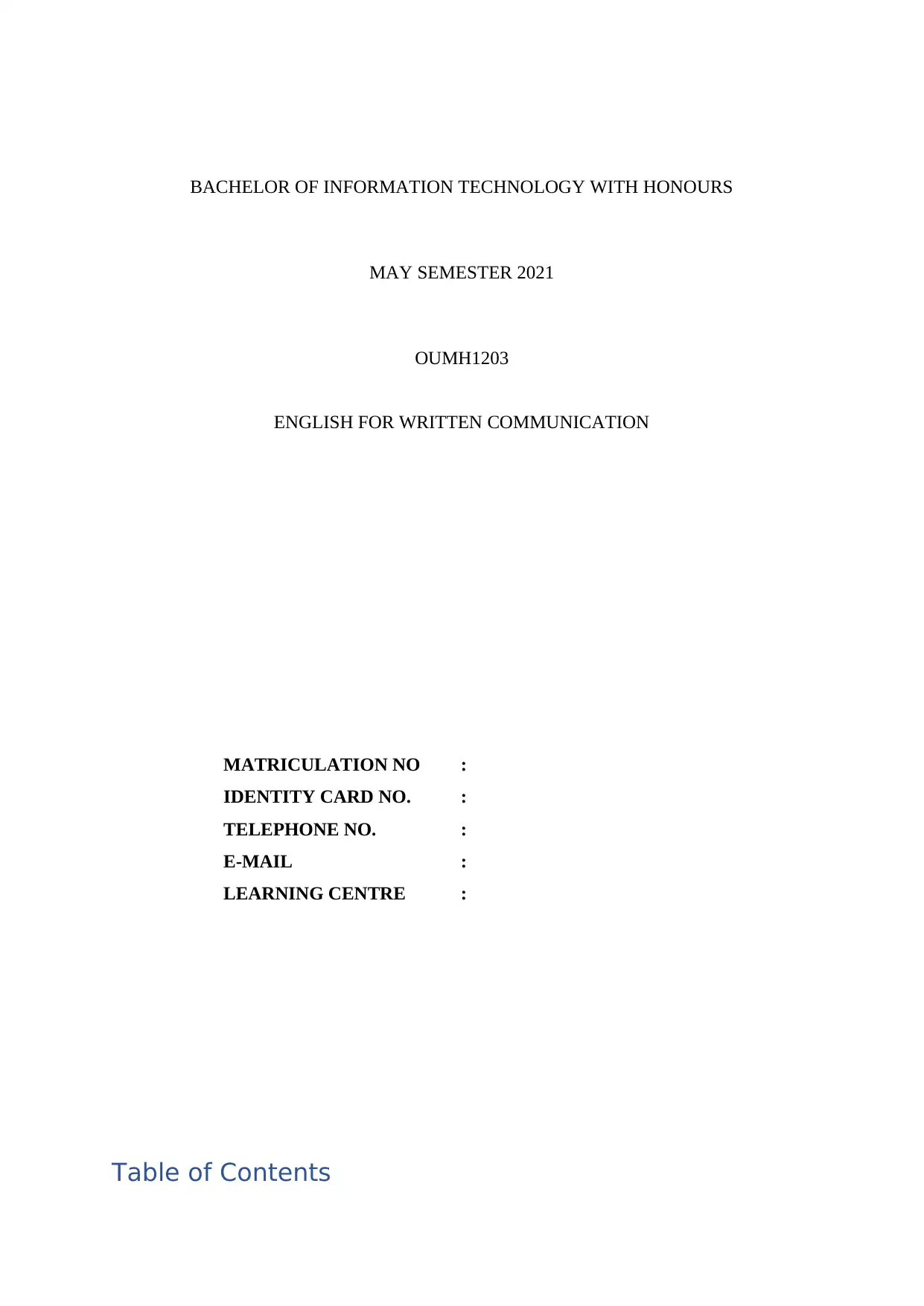
BACHELOR OF INFORMATION TECHNOLOGY WITH HONOURS
MAY SEMESTER 2021
OUMH1203
ENGLISH FOR WRITTEN COMMUNICATION
MATRICULATION NO :
IDENTITY CARD NO. :
TELEPHONE NO. :
E-MAIL :
LEARNING CENTRE :
Table of Contents
MAY SEMESTER 2021
OUMH1203
ENGLISH FOR WRITTEN COMMUNICATION
MATRICULATION NO :
IDENTITY CARD NO. :
TELEPHONE NO. :
E-MAIL :
LEARNING CENTRE :
Table of Contents
Paraphrase This Document
Need a fresh take? Get an instant paraphrase of this document with our AI Paraphraser
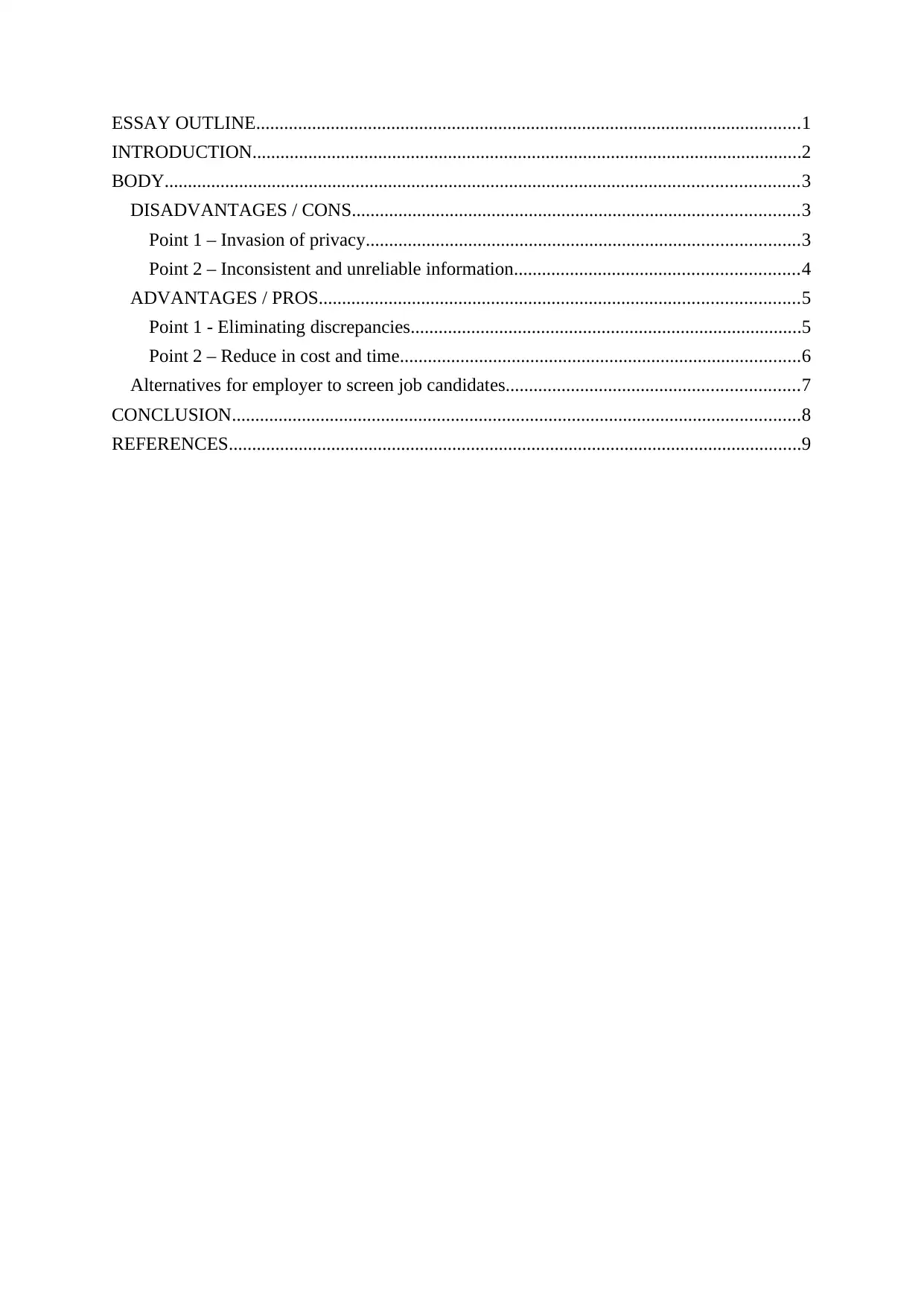
ESSAY OUTLINE.....................................................................................................................1
INTRODUCTION......................................................................................................................2
BODY........................................................................................................................................3
DISADVANTAGES / CONS................................................................................................3
Point 1 – Invasion of privacy.............................................................................................3
Point 2 – Inconsistent and unreliable information.............................................................4
ADVANTAGES / PROS.......................................................................................................5
Point 1 - Eliminating discrepancies....................................................................................5
Point 2 – Reduce in cost and time......................................................................................6
Alternatives for employer to screen job candidates...............................................................7
CONCLUSION..........................................................................................................................8
REFERENCES...........................................................................................................................9
INTRODUCTION......................................................................................................................2
BODY........................................................................................................................................3
DISADVANTAGES / CONS................................................................................................3
Point 1 – Invasion of privacy.............................................................................................3
Point 2 – Inconsistent and unreliable information.............................................................4
ADVANTAGES / PROS.......................................................................................................5
Point 1 - Eliminating discrepancies....................................................................................5
Point 2 – Reduce in cost and time......................................................................................6
Alternatives for employer to screen job candidates...............................................................7
CONCLUSION..........................................................................................................................8
REFERENCES...........................................................................................................................9
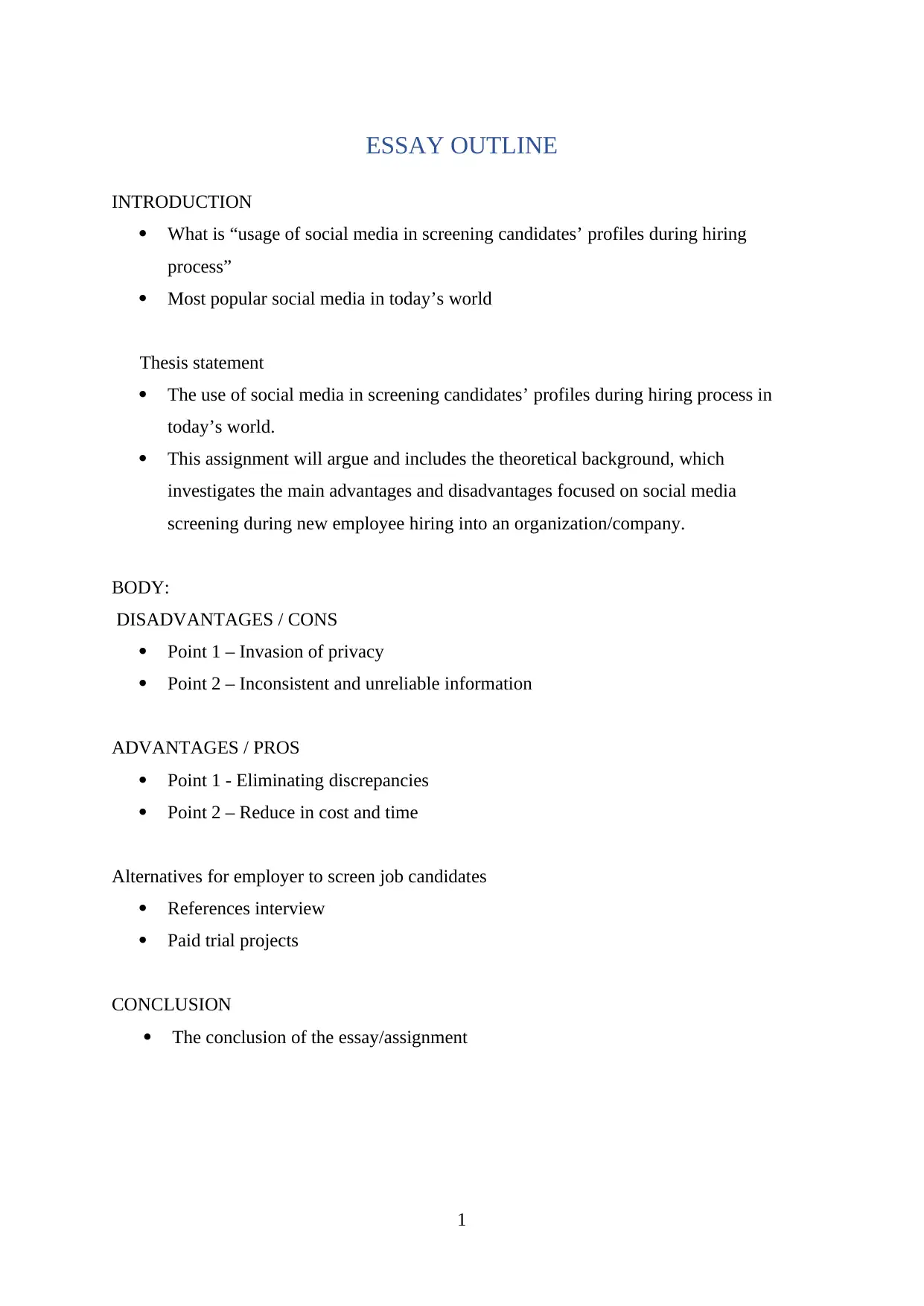
ESSAY OUTLINE
INTRODUCTION
What is “usage of social media in screening candidates’ profiles during hiring
process”
Most popular social media in today’s world
Thesis statement
The use of social media in screening candidates’ profiles during hiring process in
today’s world.
This assignment will argue and includes the theoretical background, which
investigates the main advantages and disadvantages focused on social media
screening during new employee hiring into an organization/company.
BODY:
DISADVANTAGES / CONS
Point 1 – Invasion of privacy
Point 2 – Inconsistent and unreliable information
ADVANTAGES / PROS
Point 1 - Eliminating discrepancies
Point 2 – Reduce in cost and time
Alternatives for employer to screen job candidates
References interview
Paid trial projects
CONCLUSION
The conclusion of the essay/assignment
1
INTRODUCTION
What is “usage of social media in screening candidates’ profiles during hiring
process”
Most popular social media in today’s world
Thesis statement
The use of social media in screening candidates’ profiles during hiring process in
today’s world.
This assignment will argue and includes the theoretical background, which
investigates the main advantages and disadvantages focused on social media
screening during new employee hiring into an organization/company.
BODY:
DISADVANTAGES / CONS
Point 1 – Invasion of privacy
Point 2 – Inconsistent and unreliable information
ADVANTAGES / PROS
Point 1 - Eliminating discrepancies
Point 2 – Reduce in cost and time
Alternatives for employer to screen job candidates
References interview
Paid trial projects
CONCLUSION
The conclusion of the essay/assignment
1
⊘ This is a preview!⊘
Do you want full access?
Subscribe today to unlock all pages.

Trusted by 1+ million students worldwide
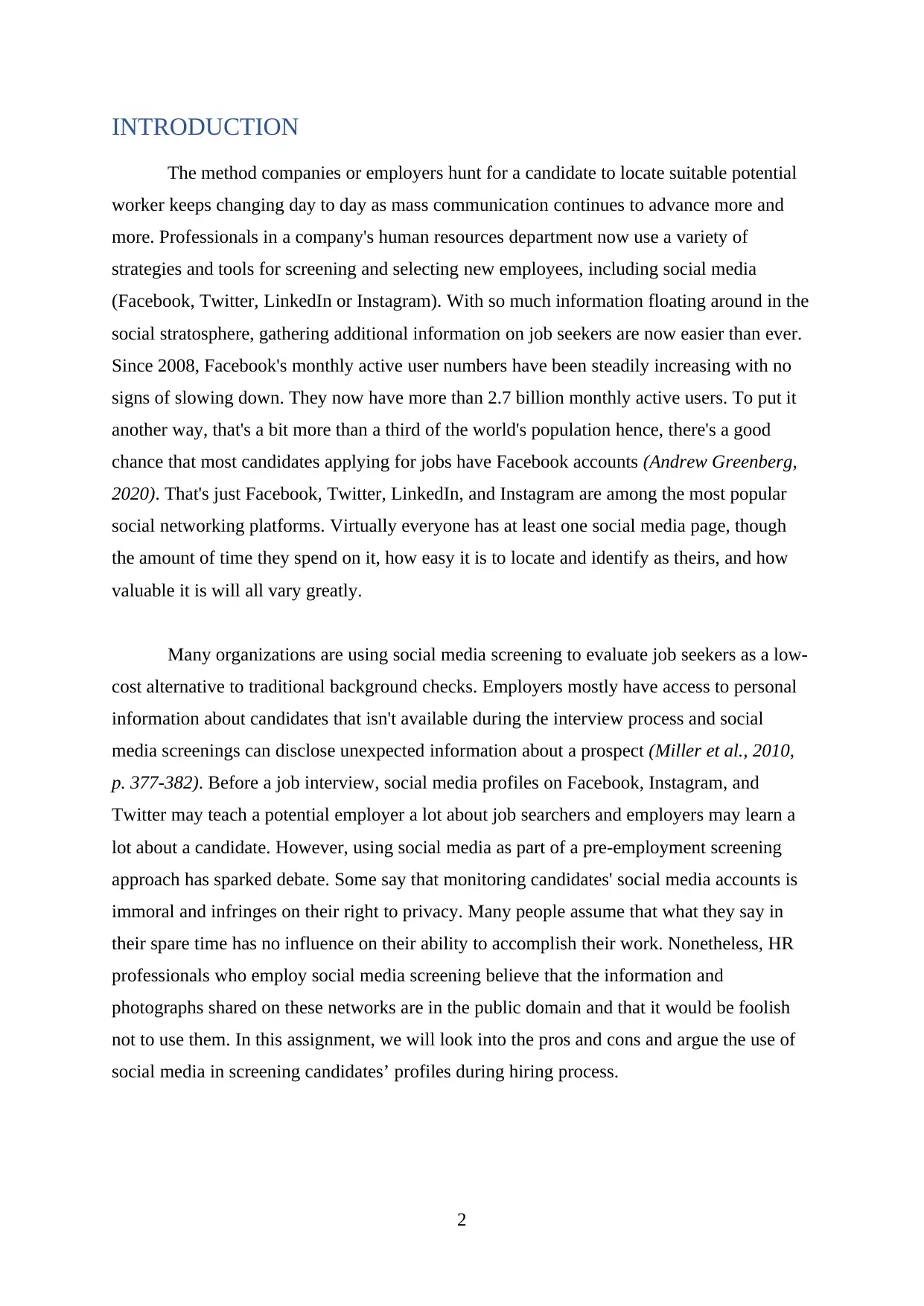
INTRODUCTION
The method companies or employers hunt for a candidate to locate suitable potential
worker keeps changing day to day as mass communication continues to advance more and
more. Professionals in a company's human resources department now use a variety of
strategies and tools for screening and selecting new employees, including social media
(Facebook, Twitter, LinkedIn or Instagram). With so much information floating around in the
social stratosphere, gathering additional information on job seekers are now easier than ever.
Since 2008, Facebook's monthly active user numbers have been steadily increasing with no
signs of slowing down. They now have more than 2.7 billion monthly active users. To put it
another way, that's a bit more than a third of the world's population hence, there's a good
chance that most candidates applying for jobs have Facebook accounts (Andrew Greenberg,
2020). That's just Facebook, Twitter, LinkedIn, and Instagram are among the most popular
social networking platforms. Virtually everyone has at least one social media page, though
the amount of time they spend on it, how easy it is to locate and identify as theirs, and how
valuable it is will all vary greatly.
Many organizations are using social media screening to evaluate job seekers as a low-
cost alternative to traditional background checks. Employers mostly have access to personal
information about candidates that isn't available during the interview process and social
media screenings can disclose unexpected information about a prospect (Miller et al., 2010,
p. 377-382). Before a job interview, social media profiles on Facebook, Instagram, and
Twitter may teach a potential employer a lot about job searchers and employers may learn a
lot about a candidate. However, using social media as part of a pre-employment screening
approach has sparked debate. Some say that monitoring candidates' social media accounts is
immoral and infringes on their right to privacy. Many people assume that what they say in
their spare time has no influence on their ability to accomplish their work. Nonetheless, HR
professionals who employ social media screening believe that the information and
photographs shared on these networks are in the public domain and that it would be foolish
not to use them. In this assignment, we will look into the pros and cons and argue the use of
social media in screening candidates’ profiles during hiring process.
2
The method companies or employers hunt for a candidate to locate suitable potential
worker keeps changing day to day as mass communication continues to advance more and
more. Professionals in a company's human resources department now use a variety of
strategies and tools for screening and selecting new employees, including social media
(Facebook, Twitter, LinkedIn or Instagram). With so much information floating around in the
social stratosphere, gathering additional information on job seekers are now easier than ever.
Since 2008, Facebook's monthly active user numbers have been steadily increasing with no
signs of slowing down. They now have more than 2.7 billion monthly active users. To put it
another way, that's a bit more than a third of the world's population hence, there's a good
chance that most candidates applying for jobs have Facebook accounts (Andrew Greenberg,
2020). That's just Facebook, Twitter, LinkedIn, and Instagram are among the most popular
social networking platforms. Virtually everyone has at least one social media page, though
the amount of time they spend on it, how easy it is to locate and identify as theirs, and how
valuable it is will all vary greatly.
Many organizations are using social media screening to evaluate job seekers as a low-
cost alternative to traditional background checks. Employers mostly have access to personal
information about candidates that isn't available during the interview process and social
media screenings can disclose unexpected information about a prospect (Miller et al., 2010,
p. 377-382). Before a job interview, social media profiles on Facebook, Instagram, and
Twitter may teach a potential employer a lot about job searchers and employers may learn a
lot about a candidate. However, using social media as part of a pre-employment screening
approach has sparked debate. Some say that monitoring candidates' social media accounts is
immoral and infringes on their right to privacy. Many people assume that what they say in
their spare time has no influence on their ability to accomplish their work. Nonetheless, HR
professionals who employ social media screening believe that the information and
photographs shared on these networks are in the public domain and that it would be foolish
not to use them. In this assignment, we will look into the pros and cons and argue the use of
social media in screening candidates’ profiles during hiring process.
2
Paraphrase This Document
Need a fresh take? Get an instant paraphrase of this document with our AI Paraphraser
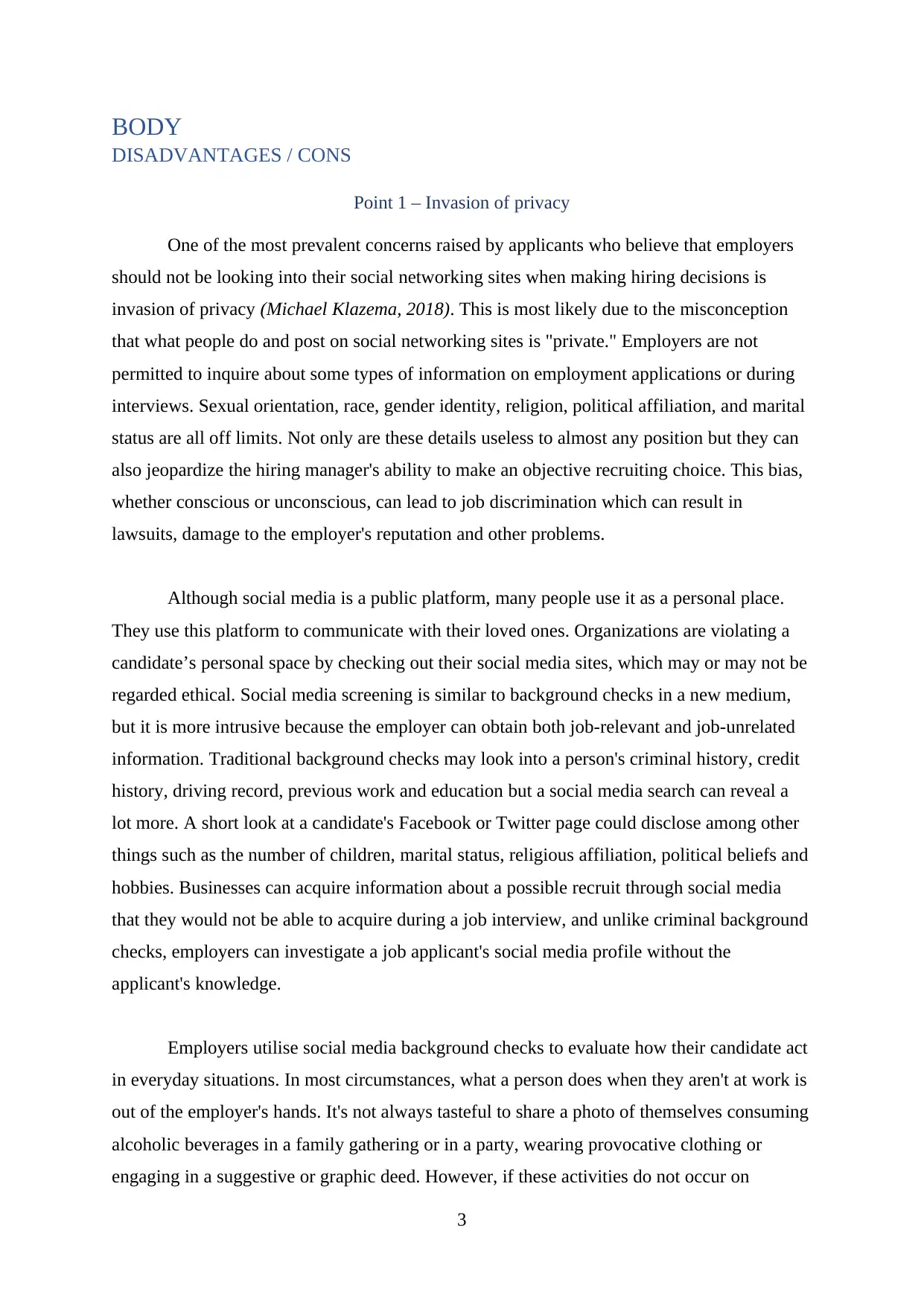
BODY
DISADVANTAGES / CONS
Point 1 – Invasion of privacy
One of the most prevalent concerns raised by applicants who believe that employers
should not be looking into their social networking sites when making hiring decisions is
invasion of privacy (Michael Klazema, 2018). This is most likely due to the misconception
that what people do and post on social networking sites is "private." Employers are not
permitted to inquire about some types of information on employment applications or during
interviews. Sexual orientation, race, gender identity, religion, political affiliation, and marital
status are all off limits. Not only are these details useless to almost any position but they can
also jeopardize the hiring manager's ability to make an objective recruiting choice. This bias,
whether conscious or unconscious, can lead to job discrimination which can result in
lawsuits, damage to the employer's reputation and other problems.
Although social media is a public platform, many people use it as a personal place.
They use this platform to communicate with their loved ones. Organizations are violating a
candidate’s personal space by checking out their social media sites, which may or may not be
regarded ethical. Social media screening is similar to background checks in a new medium,
but it is more intrusive because the employer can obtain both job-relevant and job-unrelated
information. Traditional background checks may look into a person's criminal history, credit
history, driving record, previous work and education but a social media search can reveal a
lot more. A short look at a candidate's Facebook or Twitter page could disclose among other
things such as the number of children, marital status, religious affiliation, political beliefs and
hobbies. Businesses can acquire information about a possible recruit through social media
that they would not be able to acquire during a job interview, and unlike criminal background
checks, employers can investigate a job applicant's social media profile without the
applicant's knowledge.
Employers utilise social media background checks to evaluate how their candidate act
in everyday situations. In most circumstances, what a person does when they aren't at work is
out of the employer's hands. It's not always tasteful to share a photo of themselves consuming
alcoholic beverages in a family gathering or in a party, wearing provocative clothing or
engaging in a suggestive or graphic deed. However, if these activities do not occur on
3
DISADVANTAGES / CONS
Point 1 – Invasion of privacy
One of the most prevalent concerns raised by applicants who believe that employers
should not be looking into their social networking sites when making hiring decisions is
invasion of privacy (Michael Klazema, 2018). This is most likely due to the misconception
that what people do and post on social networking sites is "private." Employers are not
permitted to inquire about some types of information on employment applications or during
interviews. Sexual orientation, race, gender identity, religion, political affiliation, and marital
status are all off limits. Not only are these details useless to almost any position but they can
also jeopardize the hiring manager's ability to make an objective recruiting choice. This bias,
whether conscious or unconscious, can lead to job discrimination which can result in
lawsuits, damage to the employer's reputation and other problems.
Although social media is a public platform, many people use it as a personal place.
They use this platform to communicate with their loved ones. Organizations are violating a
candidate’s personal space by checking out their social media sites, which may or may not be
regarded ethical. Social media screening is similar to background checks in a new medium,
but it is more intrusive because the employer can obtain both job-relevant and job-unrelated
information. Traditional background checks may look into a person's criminal history, credit
history, driving record, previous work and education but a social media search can reveal a
lot more. A short look at a candidate's Facebook or Twitter page could disclose among other
things such as the number of children, marital status, religious affiliation, political beliefs and
hobbies. Businesses can acquire information about a possible recruit through social media
that they would not be able to acquire during a job interview, and unlike criminal background
checks, employers can investigate a job applicant's social media profile without the
applicant's knowledge.
Employers utilise social media background checks to evaluate how their candidate act
in everyday situations. In most circumstances, what a person does when they aren't at work is
out of the employer's hands. It's not always tasteful to share a photo of themselves consuming
alcoholic beverages in a family gathering or in a party, wearing provocative clothing or
engaging in a suggestive or graphic deed. However, if these activities do not occur on
3
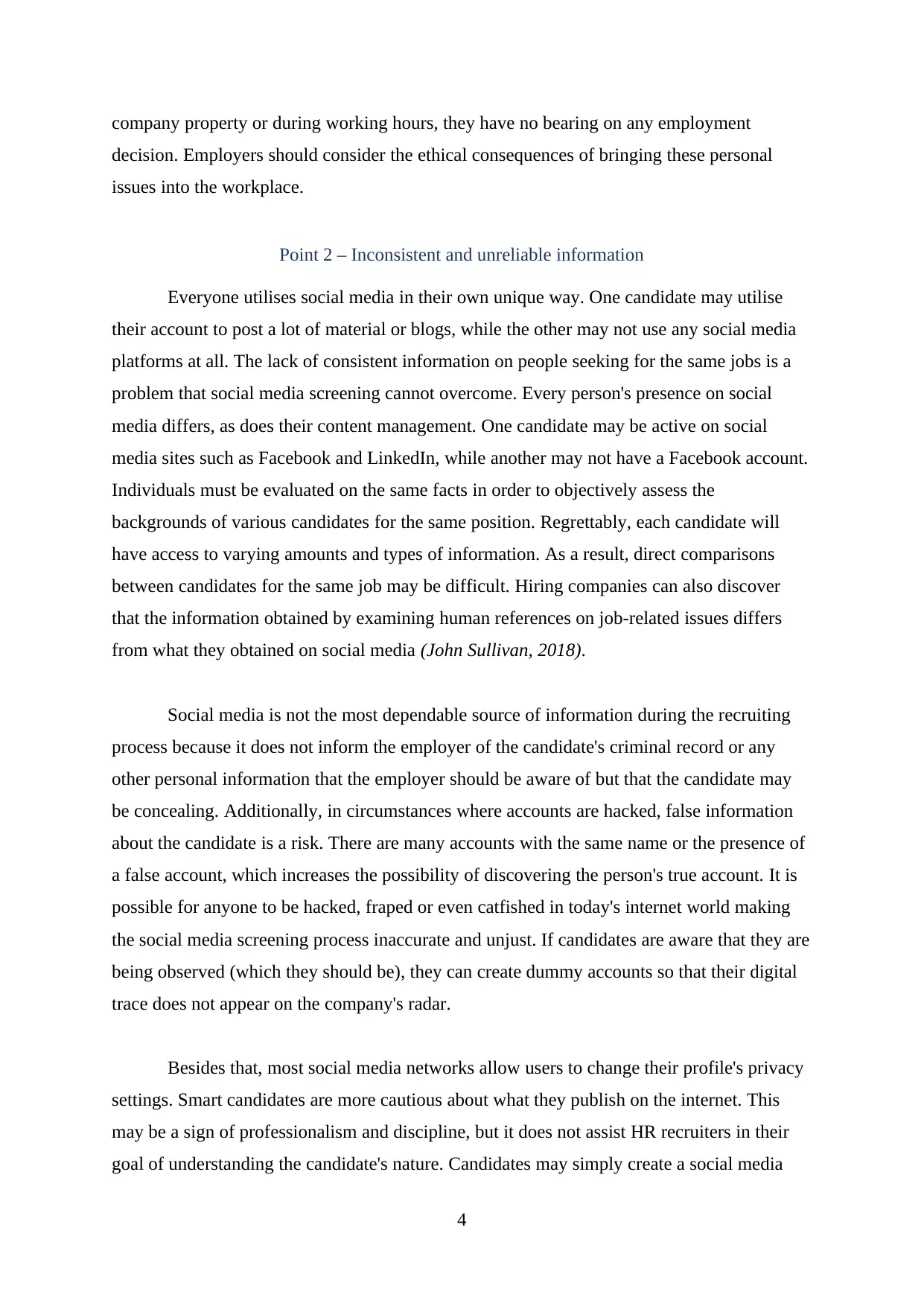
company property or during working hours, they have no bearing on any employment
decision. Employers should consider the ethical consequences of bringing these personal
issues into the workplace.
Point 2 – Inconsistent and unreliable information
Everyone utilises social media in their own unique way. One candidate may utilise
their account to post a lot of material or blogs, while the other may not use any social media
platforms at all. The lack of consistent information on people seeking for the same jobs is a
problem that social media screening cannot overcome. Every person's presence on social
media differs, as does their content management. One candidate may be active on social
media sites such as Facebook and LinkedIn, while another may not have a Facebook account.
Individuals must be evaluated on the same facts in order to objectively assess the
backgrounds of various candidates for the same position. Regrettably, each candidate will
have access to varying amounts and types of information. As a result, direct comparisons
between candidates for the same job may be difficult. Hiring companies can also discover
that the information obtained by examining human references on job-related issues differs
from what they obtained on social media (John Sullivan, 2018).
Social media is not the most dependable source of information during the recruiting
process because it does not inform the employer of the candidate's criminal record or any
other personal information that the employer should be aware of but that the candidate may
be concealing. Additionally, in circumstances where accounts are hacked, false information
about the candidate is a risk. There are many accounts with the same name or the presence of
a false account, which increases the possibility of discovering the person's true account. It is
possible for anyone to be hacked, fraped or even catfished in today's internet world making
the social media screening process inaccurate and unjust. If candidates are aware that they are
being observed (which they should be), they can create dummy accounts so that their digital
trace does not appear on the company's radar.
Besides that, most social media networks allow users to change their profile's privacy
settings. Smart candidates are more cautious about what they publish on the internet. This
may be a sign of professionalism and discipline, but it does not assist HR recruiters in their
goal of understanding the candidate's nature. Candidates may simply create a social media
4
decision. Employers should consider the ethical consequences of bringing these personal
issues into the workplace.
Point 2 – Inconsistent and unreliable information
Everyone utilises social media in their own unique way. One candidate may utilise
their account to post a lot of material or blogs, while the other may not use any social media
platforms at all. The lack of consistent information on people seeking for the same jobs is a
problem that social media screening cannot overcome. Every person's presence on social
media differs, as does their content management. One candidate may be active on social
media sites such as Facebook and LinkedIn, while another may not have a Facebook account.
Individuals must be evaluated on the same facts in order to objectively assess the
backgrounds of various candidates for the same position. Regrettably, each candidate will
have access to varying amounts and types of information. As a result, direct comparisons
between candidates for the same job may be difficult. Hiring companies can also discover
that the information obtained by examining human references on job-related issues differs
from what they obtained on social media (John Sullivan, 2018).
Social media is not the most dependable source of information during the recruiting
process because it does not inform the employer of the candidate's criminal record or any
other personal information that the employer should be aware of but that the candidate may
be concealing. Additionally, in circumstances where accounts are hacked, false information
about the candidate is a risk. There are many accounts with the same name or the presence of
a false account, which increases the possibility of discovering the person's true account. It is
possible for anyone to be hacked, fraped or even catfished in today's internet world making
the social media screening process inaccurate and unjust. If candidates are aware that they are
being observed (which they should be), they can create dummy accounts so that their digital
trace does not appear on the company's radar.
Besides that, most social media networks allow users to change their profile's privacy
settings. Smart candidates are more cautious about what they publish on the internet. This
may be a sign of professionalism and discipline, but it does not assist HR recruiters in their
goal of understanding the candidate's nature. Candidates may simply create a social media
4
⊘ This is a preview!⊘
Do you want full access?
Subscribe today to unlock all pages.

Trusted by 1+ million students worldwide
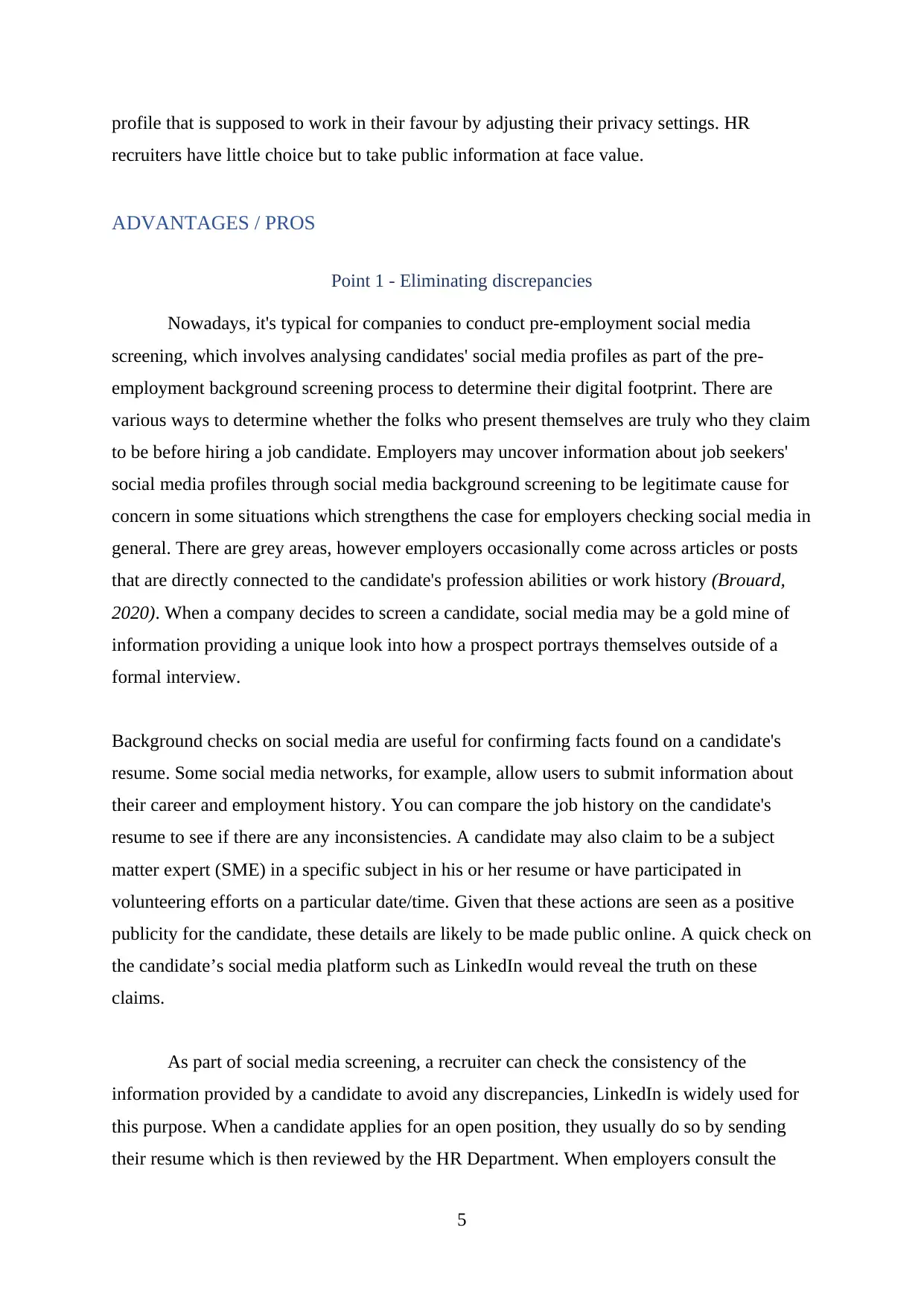
profile that is supposed to work in their favour by adjusting their privacy settings. HR
recruiters have little choice but to take public information at face value.
ADVANTAGES / PROS
Point 1 - Eliminating discrepancies
Nowadays, it's typical for companies to conduct pre-employment social media
screening, which involves analysing candidates' social media profiles as part of the pre-
employment background screening process to determine their digital footprint. There are
various ways to determine whether the folks who present themselves are truly who they claim
to be before hiring a job candidate. Employers may uncover information about job seekers'
social media profiles through social media background screening to be legitimate cause for
concern in some situations which strengthens the case for employers checking social media in
general. There are grey areas, however employers occasionally come across articles or posts
that are directly connected to the candidate's profession abilities or work history (Brouard,
2020). When a company decides to screen a candidate, social media may be a gold mine of
information providing a unique look into how a prospect portrays themselves outside of a
formal interview.
Background checks on social media are useful for confirming facts found on a candidate's
resume. Some social media networks, for example, allow users to submit information about
their career and employment history. You can compare the job history on the candidate's
resume to see if there are any inconsistencies. A candidate may also claim to be a subject
matter expert (SME) in a specific subject in his or her resume or have participated in
volunteering efforts on a particular date/time. Given that these actions are seen as a positive
publicity for the candidate, these details are likely to be made public online. A quick check on
the candidate’s social media platform such as LinkedIn would reveal the truth on these
claims.
As part of social media screening, a recruiter can check the consistency of the
information provided by a candidate to avoid any discrepancies, LinkedIn is widely used for
this purpose. When a candidate applies for an open position, they usually do so by sending
their resume which is then reviewed by the HR Department. When employers consult the
5
recruiters have little choice but to take public information at face value.
ADVANTAGES / PROS
Point 1 - Eliminating discrepancies
Nowadays, it's typical for companies to conduct pre-employment social media
screening, which involves analysing candidates' social media profiles as part of the pre-
employment background screening process to determine their digital footprint. There are
various ways to determine whether the folks who present themselves are truly who they claim
to be before hiring a job candidate. Employers may uncover information about job seekers'
social media profiles through social media background screening to be legitimate cause for
concern in some situations which strengthens the case for employers checking social media in
general. There are grey areas, however employers occasionally come across articles or posts
that are directly connected to the candidate's profession abilities or work history (Brouard,
2020). When a company decides to screen a candidate, social media may be a gold mine of
information providing a unique look into how a prospect portrays themselves outside of a
formal interview.
Background checks on social media are useful for confirming facts found on a candidate's
resume. Some social media networks, for example, allow users to submit information about
their career and employment history. You can compare the job history on the candidate's
resume to see if there are any inconsistencies. A candidate may also claim to be a subject
matter expert (SME) in a specific subject in his or her resume or have participated in
volunteering efforts on a particular date/time. Given that these actions are seen as a positive
publicity for the candidate, these details are likely to be made public online. A quick check on
the candidate’s social media platform such as LinkedIn would reveal the truth on these
claims.
As part of social media screening, a recruiter can check the consistency of the
information provided by a candidate to avoid any discrepancies, LinkedIn is widely used for
this purpose. When a candidate applies for an open position, they usually do so by sending
their resume which is then reviewed by the HR Department. When employers consult the
5
Paraphrase This Document
Need a fresh take? Get an instant paraphrase of this document with our AI Paraphraser
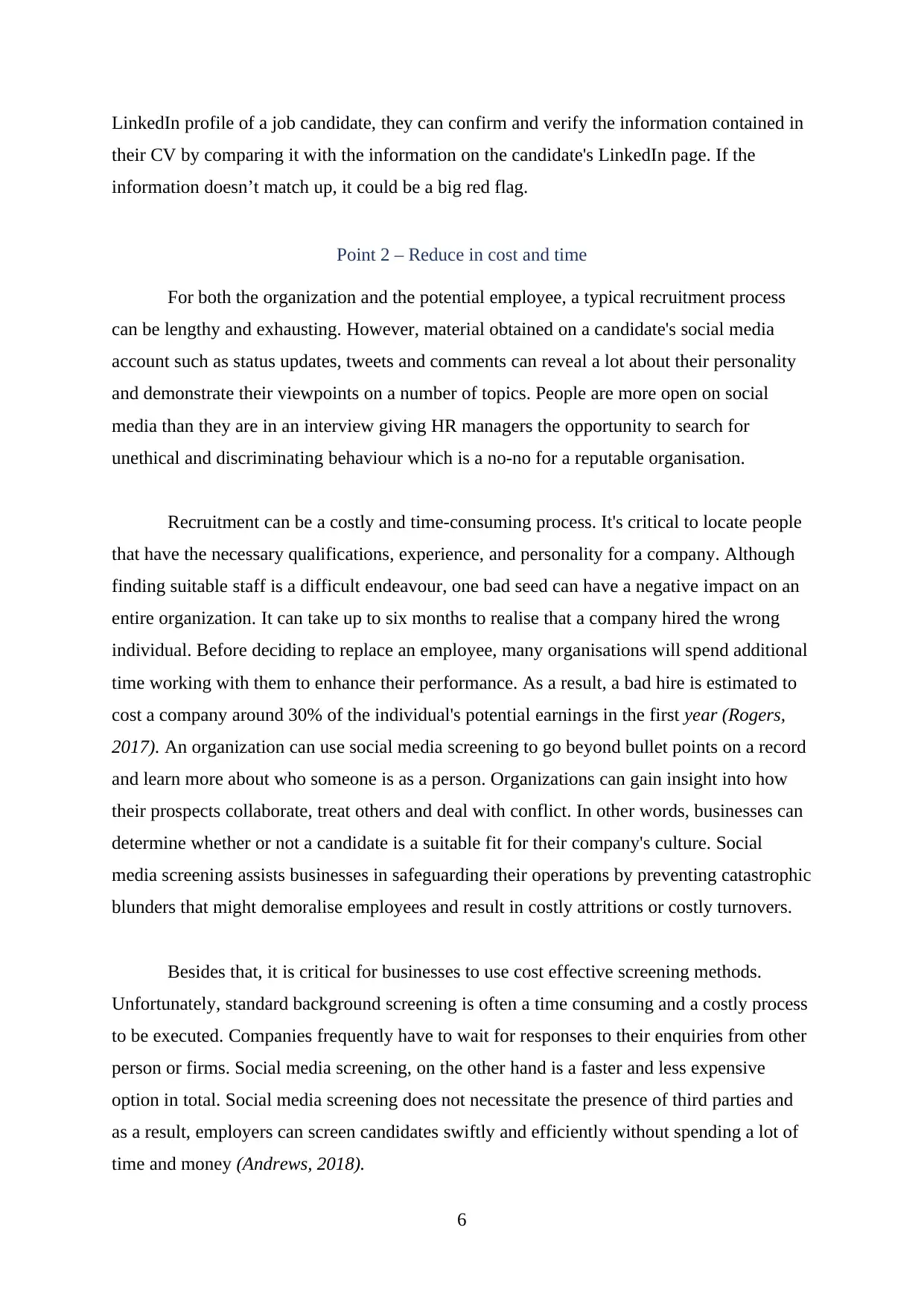
LinkedIn profile of a job candidate, they can confirm and verify the information contained in
their CV by comparing it with the information on the candidate's LinkedIn page. If the
information doesn’t match up, it could be a big red flag.
Point 2 – Reduce in cost and time
For both the organization and the potential employee, a typical recruitment process
can be lengthy and exhausting. However, material obtained on a candidate's social media
account such as status updates, tweets and comments can reveal a lot about their personality
and demonstrate their viewpoints on a number of topics. People are more open on social
media than they are in an interview giving HR managers the opportunity to search for
unethical and discriminating behaviour which is a no-no for a reputable organisation.
Recruitment can be a costly and time-consuming process. It's critical to locate people
that have the necessary qualifications, experience, and personality for a company. Although
finding suitable staff is a difficult endeavour, one bad seed can have a negative impact on an
entire organization. It can take up to six months to realise that a company hired the wrong
individual. Before deciding to replace an employee, many organisations will spend additional
time working with them to enhance their performance. As a result, a bad hire is estimated to
cost a company around 30% of the individual's potential earnings in the first year (Rogers,
2017). An organization can use social media screening to go beyond bullet points on a record
and learn more about who someone is as a person. Organizations can gain insight into how
their prospects collaborate, treat others and deal with conflict. In other words, businesses can
determine whether or not a candidate is a suitable fit for their company's culture. Social
media screening assists businesses in safeguarding their operations by preventing catastrophic
blunders that might demoralise employees and result in costly attritions or costly turnovers.
Besides that, it is critical for businesses to use cost effective screening methods.
Unfortunately, standard background screening is often a time consuming and a costly process
to be executed. Companies frequently have to wait for responses to their enquiries from other
person or firms. Social media screening, on the other hand is a faster and less expensive
option in total. Social media screening does not necessitate the presence of third parties and
as a result, employers can screen candidates swiftly and efficiently without spending a lot of
time and money (Andrews, 2018).
6
their CV by comparing it with the information on the candidate's LinkedIn page. If the
information doesn’t match up, it could be a big red flag.
Point 2 – Reduce in cost and time
For both the organization and the potential employee, a typical recruitment process
can be lengthy and exhausting. However, material obtained on a candidate's social media
account such as status updates, tweets and comments can reveal a lot about their personality
and demonstrate their viewpoints on a number of topics. People are more open on social
media than they are in an interview giving HR managers the opportunity to search for
unethical and discriminating behaviour which is a no-no for a reputable organisation.
Recruitment can be a costly and time-consuming process. It's critical to locate people
that have the necessary qualifications, experience, and personality for a company. Although
finding suitable staff is a difficult endeavour, one bad seed can have a negative impact on an
entire organization. It can take up to six months to realise that a company hired the wrong
individual. Before deciding to replace an employee, many organisations will spend additional
time working with them to enhance their performance. As a result, a bad hire is estimated to
cost a company around 30% of the individual's potential earnings in the first year (Rogers,
2017). An organization can use social media screening to go beyond bullet points on a record
and learn more about who someone is as a person. Organizations can gain insight into how
their prospects collaborate, treat others and deal with conflict. In other words, businesses can
determine whether or not a candidate is a suitable fit for their company's culture. Social
media screening assists businesses in safeguarding their operations by preventing catastrophic
blunders that might demoralise employees and result in costly attritions or costly turnovers.
Besides that, it is critical for businesses to use cost effective screening methods.
Unfortunately, standard background screening is often a time consuming and a costly process
to be executed. Companies frequently have to wait for responses to their enquiries from other
person or firms. Social media screening, on the other hand is a faster and less expensive
option in total. Social media screening does not necessitate the presence of third parties and
as a result, employers can screen candidates swiftly and efficiently without spending a lot of
time and money (Andrews, 2018).
6
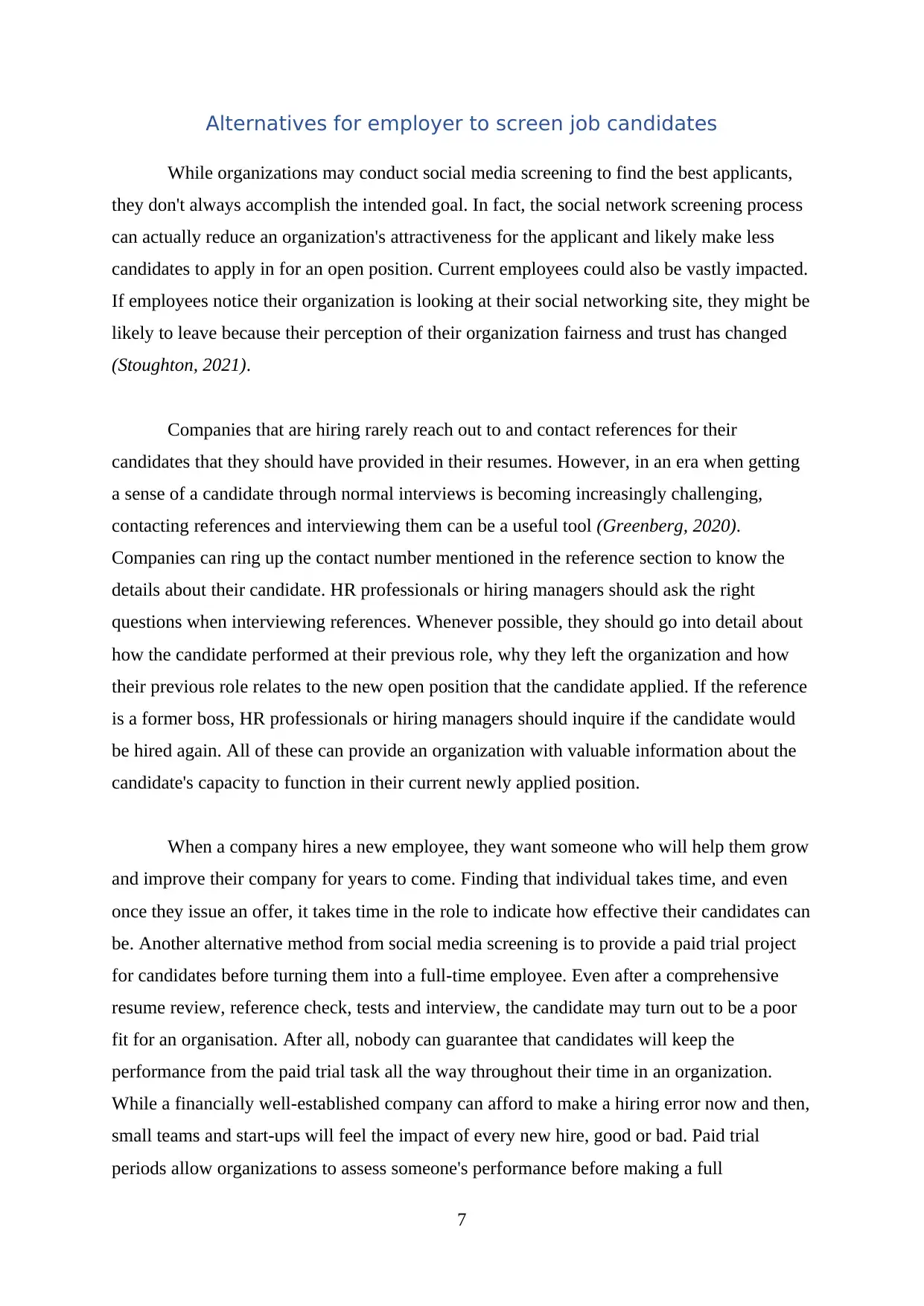
Alternatives for employer to screen job candidates
While organizations may conduct social media screening to find the best applicants,
they don't always accomplish the intended goal. In fact, the social network screening process
can actually reduce an organization's attractiveness for the applicant and likely make less
candidates to apply in for an open position. Current employees could also be vastly impacted.
If employees notice their organization is looking at their social networking site, they might be
likely to leave because their perception of their organization fairness and trust has changed
(Stoughton, 2021).
Companies that are hiring rarely reach out to and contact references for their
candidates that they should have provided in their resumes. However, in an era when getting
a sense of a candidate through normal interviews is becoming increasingly challenging,
contacting references and interviewing them can be a useful tool (Greenberg, 2020).
Companies can ring up the contact number mentioned in the reference section to know the
details about their candidate. HR professionals or hiring managers should ask the right
questions when interviewing references. Whenever possible, they should go into detail about
how the candidate performed at their previous role, why they left the organization and how
their previous role relates to the new open position that the candidate applied. If the reference
is a former boss, HR professionals or hiring managers should inquire if the candidate would
be hired again. All of these can provide an organization with valuable information about the
candidate's capacity to function in their current newly applied position.
When a company hires a new employee, they want someone who will help them grow
and improve their company for years to come. Finding that individual takes time, and even
once they issue an offer, it takes time in the role to indicate how effective their candidates can
be. Another alternative method from social media screening is to provide a paid trial project
for candidates before turning them into a full-time employee. Even after a comprehensive
resume review, reference check, tests and interview, the candidate may turn out to be a poor
fit for an organisation. After all, nobody can guarantee that candidates will keep the
performance from the paid trial task all the way throughout their time in an organization.
While a financially well-established company can afford to make a hiring error now and then,
small teams and start-ups will feel the impact of every new hire, good or bad. Paid trial
periods allow organizations to assess someone's performance before making a full
7
While organizations may conduct social media screening to find the best applicants,
they don't always accomplish the intended goal. In fact, the social network screening process
can actually reduce an organization's attractiveness for the applicant and likely make less
candidates to apply in for an open position. Current employees could also be vastly impacted.
If employees notice their organization is looking at their social networking site, they might be
likely to leave because their perception of their organization fairness and trust has changed
(Stoughton, 2021).
Companies that are hiring rarely reach out to and contact references for their
candidates that they should have provided in their resumes. However, in an era when getting
a sense of a candidate through normal interviews is becoming increasingly challenging,
contacting references and interviewing them can be a useful tool (Greenberg, 2020).
Companies can ring up the contact number mentioned in the reference section to know the
details about their candidate. HR professionals or hiring managers should ask the right
questions when interviewing references. Whenever possible, they should go into detail about
how the candidate performed at their previous role, why they left the organization and how
their previous role relates to the new open position that the candidate applied. If the reference
is a former boss, HR professionals or hiring managers should inquire if the candidate would
be hired again. All of these can provide an organization with valuable information about the
candidate's capacity to function in their current newly applied position.
When a company hires a new employee, they want someone who will help them grow
and improve their company for years to come. Finding that individual takes time, and even
once they issue an offer, it takes time in the role to indicate how effective their candidates can
be. Another alternative method from social media screening is to provide a paid trial project
for candidates before turning them into a full-time employee. Even after a comprehensive
resume review, reference check, tests and interview, the candidate may turn out to be a poor
fit for an organisation. After all, nobody can guarantee that candidates will keep the
performance from the paid trial task all the way throughout their time in an organization.
While a financially well-established company can afford to make a hiring error now and then,
small teams and start-ups will feel the impact of every new hire, good or bad. Paid trial
periods allow organizations to assess someone's performance before making a full
7
⊘ This is a preview!⊘
Do you want full access?
Subscribe today to unlock all pages.

Trusted by 1+ million students worldwide
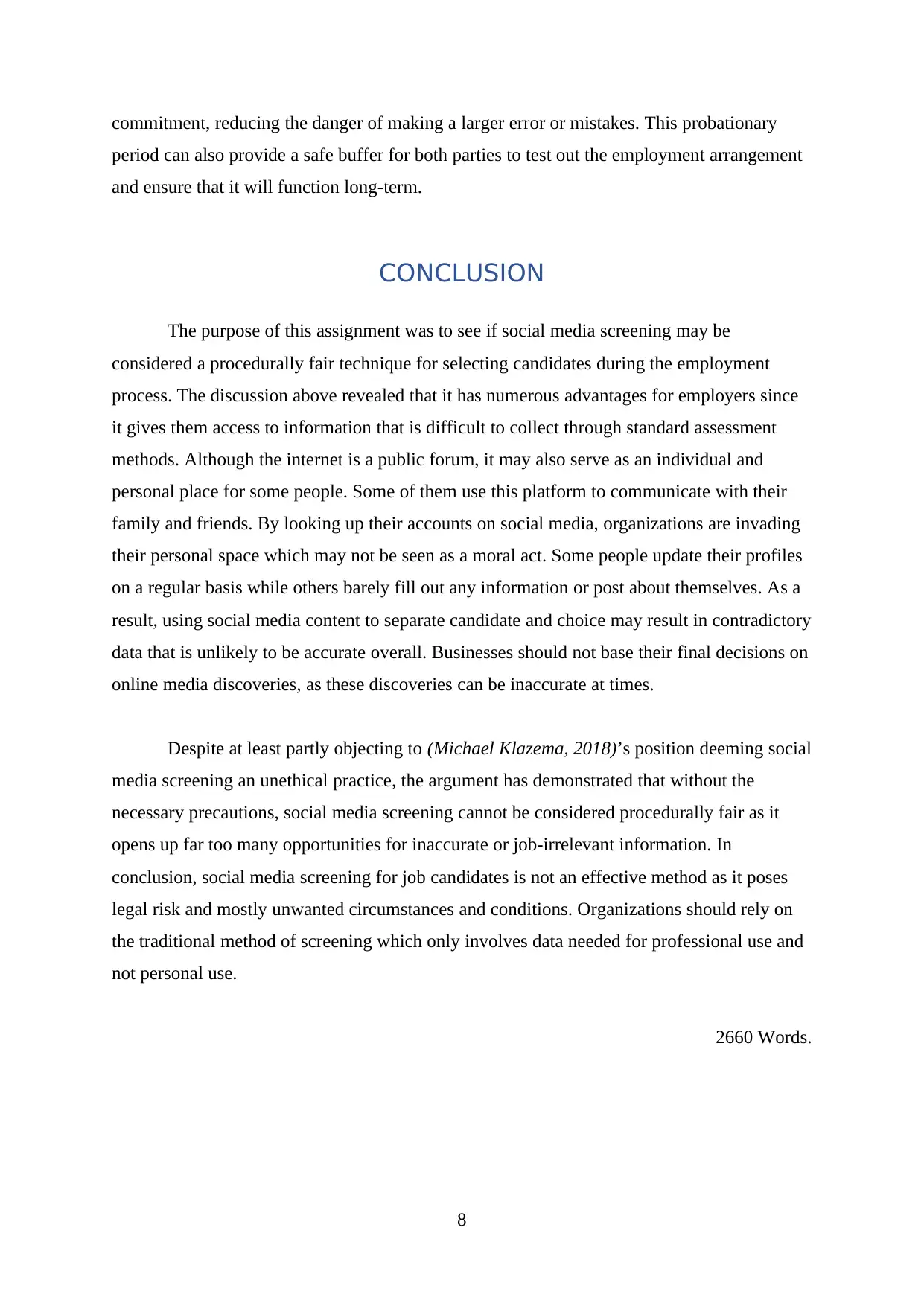
commitment, reducing the danger of making a larger error or mistakes. This probationary
period can also provide a safe buffer for both parties to test out the employment arrangement
and ensure that it will function long-term.
CONCLUSION
The purpose of this assignment was to see if social media screening may be
considered a procedurally fair technique for selecting candidates during the employment
process. The discussion above revealed that it has numerous advantages for employers since
it gives them access to information that is difficult to collect through standard assessment
methods. Although the internet is a public forum, it may also serve as an individual and
personal place for some people. Some of them use this platform to communicate with their
family and friends. By looking up their accounts on social media, organizations are invading
their personal space which may not be seen as a moral act. Some people update their profiles
on a regular basis while others barely fill out any information or post about themselves. As a
result, using social media content to separate candidate and choice may result in contradictory
data that is unlikely to be accurate overall. Businesses should not base their final decisions on
online media discoveries, as these discoveries can be inaccurate at times.
Despite at least partly objecting to (Michael Klazema, 2018)’s position deeming social
media screening an unethical practice, the argument has demonstrated that without the
necessary precautions, social media screening cannot be considered procedurally fair as it
opens up far too many opportunities for inaccurate or job-irrelevant information. In
conclusion, social media screening for job candidates is not an effective method as it poses
legal risk and mostly unwanted circumstances and conditions. Organizations should rely on
the traditional method of screening which only involves data needed for professional use and
not personal use.
2660 Words.
8
period can also provide a safe buffer for both parties to test out the employment arrangement
and ensure that it will function long-term.
CONCLUSION
The purpose of this assignment was to see if social media screening may be
considered a procedurally fair technique for selecting candidates during the employment
process. The discussion above revealed that it has numerous advantages for employers since
it gives them access to information that is difficult to collect through standard assessment
methods. Although the internet is a public forum, it may also serve as an individual and
personal place for some people. Some of them use this platform to communicate with their
family and friends. By looking up their accounts on social media, organizations are invading
their personal space which may not be seen as a moral act. Some people update their profiles
on a regular basis while others barely fill out any information or post about themselves. As a
result, using social media content to separate candidate and choice may result in contradictory
data that is unlikely to be accurate overall. Businesses should not base their final decisions on
online media discoveries, as these discoveries can be inaccurate at times.
Despite at least partly objecting to (Michael Klazema, 2018)’s position deeming social
media screening an unethical practice, the argument has demonstrated that without the
necessary precautions, social media screening cannot be considered procedurally fair as it
opens up far too many opportunities for inaccurate or job-irrelevant information. In
conclusion, social media screening for job candidates is not an effective method as it poses
legal risk and mostly unwanted circumstances and conditions. Organizations should rely on
the traditional method of screening which only involves data needed for professional use and
not personal use.
2660 Words.
8
Paraphrase This Document
Need a fresh take? Get an instant paraphrase of this document with our AI Paraphraser
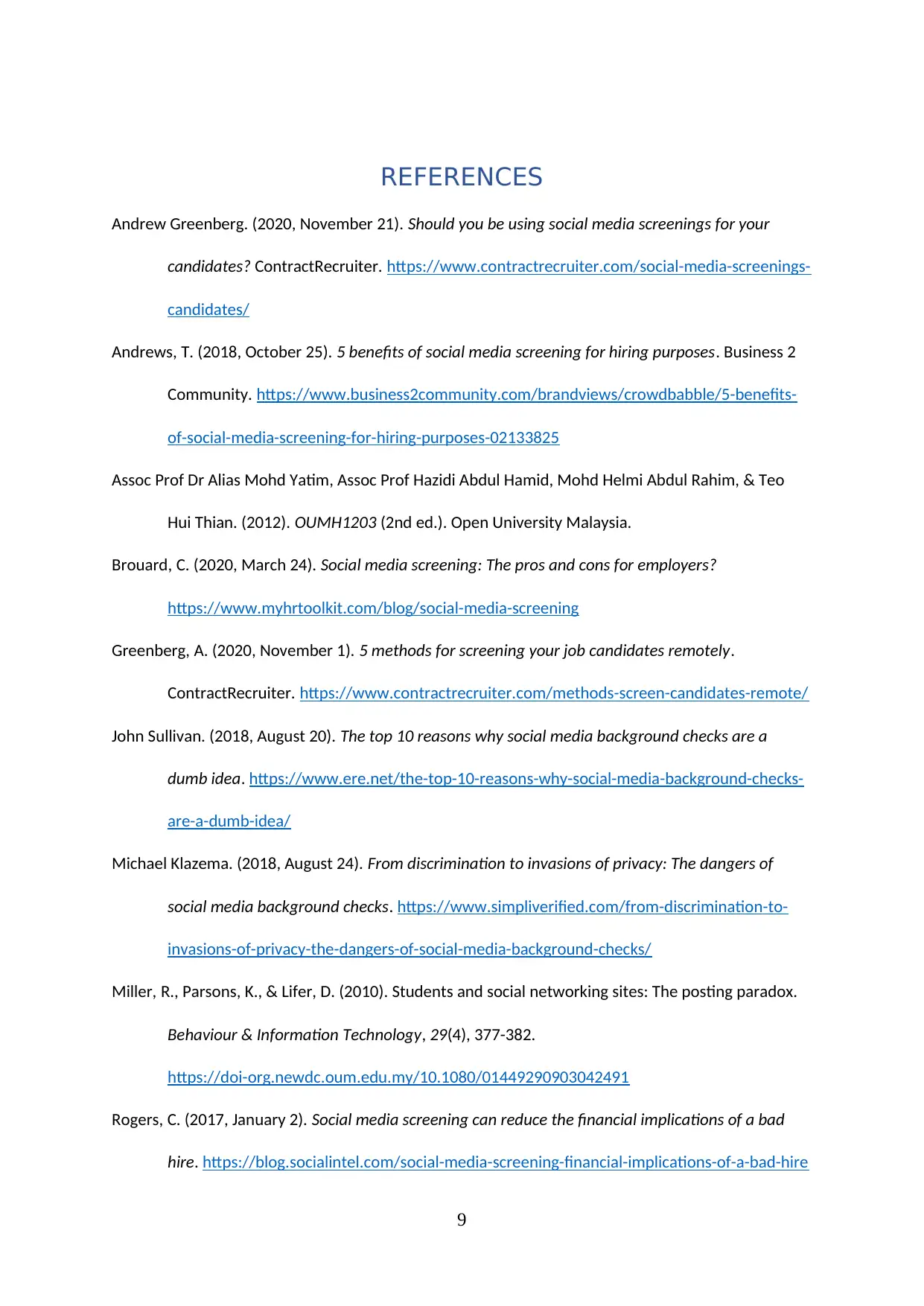
REFERENCES
Andrew Greenberg. (2020, November 21). Should you be using social media screenings for your
candidates? ContractRecruiter. https://www.contractrecruiter.com/social-media-screenings-
candidates/
Andrews, T. (2018, October 25). 5 benefits of social media screening for hiring purposes. Business 2
Community. https://www.business2community.com/brandviews/crowdbabble/5-benefits-
of-social-media-screening-for-hiring-purposes-02133825
Assoc Prof Dr Alias Mohd Yatim, Assoc Prof Hazidi Abdul Hamid, Mohd Helmi Abdul Rahim, & Teo
Hui Thian. (2012). OUMH1203 (2nd ed.). Open University Malaysia.
Brouard, C. (2020, March 24). Social media screening: The pros and cons for employers?
https://www.myhrtoolkit.com/blog/social-media-screening
Greenberg, A. (2020, November 1). 5 methods for screening your job candidates remotely.
ContractRecruiter. https://www.contractrecruiter.com/methods-screen-candidates-remote/
John Sullivan. (2018, August 20). The top 10 reasons why social media background checks are a
dumb idea. https://www.ere.net/the-top-10-reasons-why-social-media-background-checks-
are-a-dumb-idea/
Michael Klazema. (2018, August 24). From discrimination to invasions of privacy: The dangers of
social media background checks. https://www.simpliverified.com/from-discrimination-to-
invasions-of-privacy-the-dangers-of-social-media-background-checks/
Miller, R., Parsons, K., & Lifer, D. (2010). Students and social networking sites: The posting paradox.
Behaviour & Information Technology, 29(4), 377-382.
https://doi-org.newdc.oum.edu.my/10.1080/01449290903042491
Rogers, C. (2017, January 2). Social media screening can reduce the financial implications of a bad
hire. https://blog.socialintel.com/social-media-screening-financial-implications-of-a-bad-hire
9
Andrew Greenberg. (2020, November 21). Should you be using social media screenings for your
candidates? ContractRecruiter. https://www.contractrecruiter.com/social-media-screenings-
candidates/
Andrews, T. (2018, October 25). 5 benefits of social media screening for hiring purposes. Business 2
Community. https://www.business2community.com/brandviews/crowdbabble/5-benefits-
of-social-media-screening-for-hiring-purposes-02133825
Assoc Prof Dr Alias Mohd Yatim, Assoc Prof Hazidi Abdul Hamid, Mohd Helmi Abdul Rahim, & Teo
Hui Thian. (2012). OUMH1203 (2nd ed.). Open University Malaysia.
Brouard, C. (2020, March 24). Social media screening: The pros and cons for employers?
https://www.myhrtoolkit.com/blog/social-media-screening
Greenberg, A. (2020, November 1). 5 methods for screening your job candidates remotely.
ContractRecruiter. https://www.contractrecruiter.com/methods-screen-candidates-remote/
John Sullivan. (2018, August 20). The top 10 reasons why social media background checks are a
dumb idea. https://www.ere.net/the-top-10-reasons-why-social-media-background-checks-
are-a-dumb-idea/
Michael Klazema. (2018, August 24). From discrimination to invasions of privacy: The dangers of
social media background checks. https://www.simpliverified.com/from-discrimination-to-
invasions-of-privacy-the-dangers-of-social-media-background-checks/
Miller, R., Parsons, K., & Lifer, D. (2010). Students and social networking sites: The posting paradox.
Behaviour & Information Technology, 29(4), 377-382.
https://doi-org.newdc.oum.edu.my/10.1080/01449290903042491
Rogers, C. (2017, January 2). Social media screening can reduce the financial implications of a bad
hire. https://blog.socialintel.com/social-media-screening-financial-implications-of-a-bad-hire
9
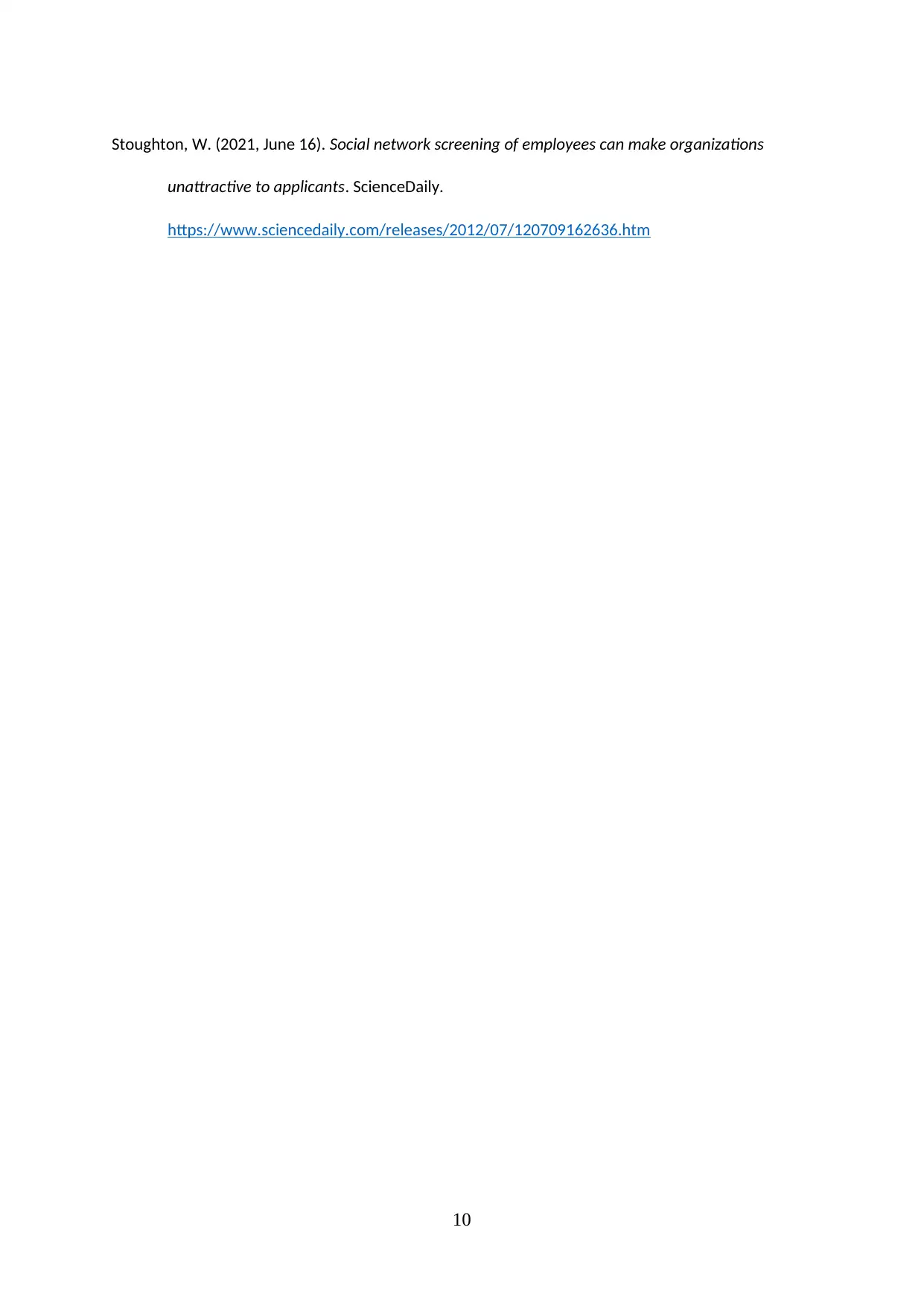
Stoughton, W. (2021, June 16). Social network screening of employees can make organizations
unattractive to applicants. ScienceDaily.
https://www.sciencedaily.com/releases/2012/07/120709162636.htm
10
unattractive to applicants. ScienceDaily.
https://www.sciencedaily.com/releases/2012/07/120709162636.htm
10
⊘ This is a preview!⊘
Do you want full access?
Subscribe today to unlock all pages.

Trusted by 1+ million students worldwide
1 out of 12
Related Documents
Your All-in-One AI-Powered Toolkit for Academic Success.
+13062052269
info@desklib.com
Available 24*7 on WhatsApp / Email
![[object Object]](/_next/static/media/star-bottom.7253800d.svg)
Unlock your academic potential
Copyright © 2020–2026 A2Z Services. All Rights Reserved. Developed and managed by ZUCOL.





